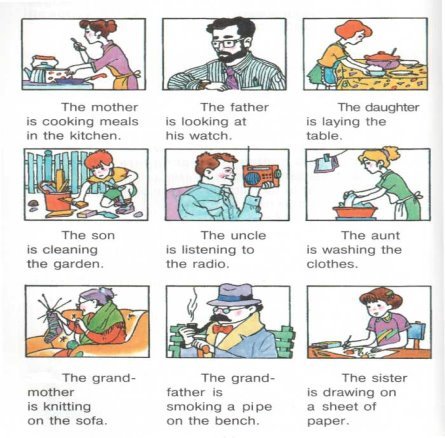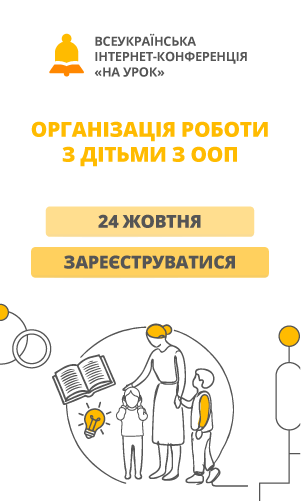Конспект уроку на тему" Домашні обовязки"
Topic. Обов’язки в моїй сім’ї.
Objectives:
- to practice students’ speaking skills;
- to revise and enrich students’ vocabulary on the topic;
- to develop listening for gist and details.
Equipment: textbooks, a tape recorder, handouts.
The Course of the Lesson
I. The Beginning of the Lesson.
1. Organizing the class for the lesson.
T.: Did you have supper yesterday? Who cooked the supper? Did you help you mother? What did you do?
2. Warm-up activities.
T.: Here are some English proverbs, but I have problems with understanding their meaning. Can you, please, help me with their equivalents? Can you also explain them to me?
- An apple a day keeps the doctors away.
- Eat with pleasure, drink with measure.
- One should eat to live, not live to eat.
- After dinner sit a while, after supper walk a mile.
II. The Main Body of the Lesson.
3. Homework check-up.

T.: It’s Saturday today. The whole family is at home. It’s 11o’clock. They have been doing some work since 9 o’clock.
What has the mother been doing?
What has the father been doing?
What has the daughter been doing?
What has the son been doing?
What has the grandfather been doing?
What has the grandmother been doing?
What has the uncle been doing?
What has the aunt been doing?
What has the sister been doing?
How long have they been doing their work?
4. Presenting new material.
T.: On the blackboard you can see some new words. Read them and try to explain them in English.
domestic – relating to people’s homes and family life.
management – the process of controlling or managing something.
conveniences – a condition that makes it easier to do something.
require – to need something or someone.
clothesline – a rope on which you hang wet clothes so that they can dry.
5. Practising new material.
T.: Listen to the text. While listening to it pay attention to the use of new words.
Housekeeping is the everyday practice of domestic science at home. It is the management of a house and the affairs of a house and family. It is what someone in your family has to do in spite of all the modern conveniences that townspeople have today.
Life in the countryside, however, requires much more time and effort. Somebody has to chop wood and bring water for cooking and washing. You may have a vegetable garden, too, where you can grow vegetables for the table. You may keep chickens and other domestic animals. Somebody must take care of them.
Domestic duties may take much of your time, but if all the members of the family help, if each one has his special duties, keeping house won’t be so difficult.
Children help their parents in different ways. They can clean the house, make their beds, bring in dry things from the clotheslines, do the ironing and even cook simple meals. Junior schoolchildren lay the table and help with the washing-up. If the family is large, the older children help to look after the little ones, and that is a great help to the mother.
In this way children learn to do things for themselves, and get practice in housekeeping.
Answer the questions:
- What do you know about housekeeping?
- What are your domestic duties?
- How much time do they take?
- How do children help their parents?
- Can you name some children’s home duties not mentioned in the text?
Reading.
T.: We usually help our parents about the house, to cook some dishes. You will read the text about the way people cooked at different times.
People throughout history used different methods of cooking.
People roasted meat over small open fires. Boiling appeared later than other methods of cooking because it needed a container for the water. People boiled food in leather, wood basket and shells before metal containers were developed.
During the Middle Ages, a period that lasted from the AD 400s to the 1500s, people in Europe used fireplaces for cooking. They heated food in a kettle and roasted meat over the fire. Only the wealthy had ovens in their homes.
Iron cook stoves, most of which burned wood, became popular in the early 1800s. Gas cookers began to be used in cities during the 1860s.
Electric cookers became popular in the 1930s.
Microwave ovens were introduced in the 1950s. As a result, cooking today is much easier and faster than ever.
T.: Find in the text the following words.
- спосіб куховарення;
- відкритий вогонь;
- ємкість для води;
- газова плита;
- ставати популярним;
- бути представленим;
- жарити м'ясо над вогнем.
T.: What methods of cooking do we use nowadays? What are the most popular methods in your family?
T.: On the handouts you can see the table with letters. You must search the 11 words to complete the sentences below. Now read the sentences you have.
|
A |
C |
H |
O |
P |
E |
R |
T |
O |
R |
|
S |
W |
L |
O |
S |
R |
S |
F |
R |
Y |
|
E |
O |
M |
I |
X |
B |
L |
U |
P |
D |
|
R |
Z |
C |
A |
T |
M |
I |
W |
O |
Y |
|
V |
C |
A |
K |
L |
D |
C |
A |
U |
B |
|
E |
M |
A |
S |
H |
T |
E |
S |
R |
A |
|
D |
S |
E |
R |
H |
D |
O |
H |
E |
K |
|
C |
U |
T |
J |
F |
R |
O |
C |
X |
E |
|
T |
F |
O |
M |
A |
Y |
U |
C |
I |
P |
|
B |
O |
B |
O |
I |
L |
S |
I |
S |
I |
- When the water boils, add the rice.
- Vegetables should be stored in a cool ………….. place.
- You should always ……………fruit before eating it.
- Heat the oil in a large pan and ………….the onion for 5 minutes.
- ………………. the meat into small cubes.
- Add the egg and ………………with sugar.
- ………………. the mixture into a dish and …………….. in oven for 45 minutes.
- Dinner is …………. between 7 and 10 pm.
- I’ll …………………. some bread.
- …………….. the potatoes with a little milk.
- The apples are ………………. in half.
6. Checking up the students’ comprehension of the lesson.
Let’s revise the Present Perfect Continuous Tense. You have to read the situation and then answer my question “What have they been doing?”
- Ann is very tired.
- Bob has a black eye and Bill has a cut lip.
- George has just come back from the beach. He is very red.
- Janet is hot and tired.
T.: Does your family work about the house at the weekends? What is your family’s attitude to your home? How often does your family do repairs and improvements to your house? What is your usual part of work on these days?
III. The End of the Lesson.
7. Homework setting.
T.: Your homework is to write the letter to the “English Bridge” telling about the householding duties in your family.
8. Summing up.
Listen to the poem “When Mummy is Away”. While listening the poem think what must we do while mother is away.
P1.: I think that while mummy is away we must …
P2.: To my mind we have to …
P3.: And as for me …


про публікацію авторської розробки
Додати розробку
